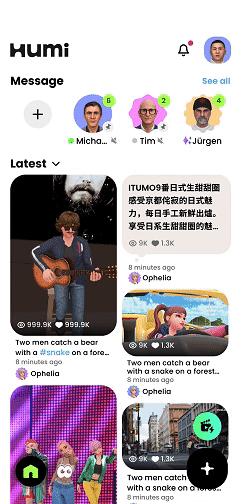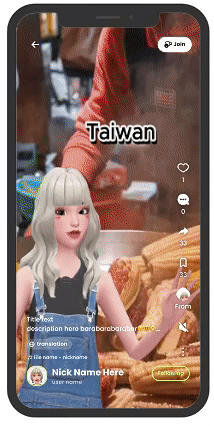Humi
A platform designed for Gen Z that leverages AI and personalized avatars, enabling users to share content and express emotions through short videos or written posts, fostering identity and belonging.
*DAU has grown by 5 times.
*Securing $25M in strategic investment.
2023 Jul - Now
Product Team Leader/ UX Manager

Challenge
Challenge
Humi was a project I led to help the company secure investment. It was an event-driven platform featuring dedicated spaces for religion, culture, art, and pop trends — including collaborations with institutions like the Ju Ming Museum, Chaotian Temple, and the National Palace Museum.
By hosting a wide range of events, Humi successfully attracted a large and diverse audience, especially Gen Z users drawn to its vibrant and immersive atmosphere.

.png)

The key challenge:
How can we keep Gen Z users engaged with the platform when no events are happening?
User Context
Competitor Analysis
In the early stages of product development, I analyzed the most popular apps among Gen Z users — including those featuring avatars — to understand what makes them appealing and why they resonate with this audience.


User Interviews
I interviewed six Gen Z users in-depth to explore how virtual characters could meaningfully support their needs and experiences. Below is the persona I created, along with the key pain points.

Concept
Product Concept
After conducting the analysis and interviews, I shared my observations and insights with design team. I led the initiative and collaborated closely with the team to brainstorm.


Design goal:
A platform tailored to Gen Z users, where they can freely express themselves without showing their face or fearing ridicule.
Based on the brainstorming ideas, I planned the overall framework and laid out the keyframes as below, I then proposed the platform concept to my design manager, who is also the product owner, and received approval. Next, I discussed and assigned tasks with the design team. Each designer developed details for their respective assignments, and finally, we integrated everything.


-
Create Short Videos & Share Mood
-
Create personalized short videos by using your device camera or VR device to track your facial expressions and movements, and transform them into expressive avatar performances.
-
Speak your mind anonymously and reach people from all over the world.
-
Record Videos Using Tracking Your Facial Expressions and Movements

Share My Mood with

Platform for Boundless Imagination
-
Share Creations with the Public
-
Customize your avatar with full control over hairstyle, face shape, skin tone, outfit, and more — create a look that truly represents you.
-
Showcase your creations and share them with the public to express yourself.
-
Share Creations with the Public
Using Personalized Avatar

-
Avatar Message
-
Beyond text messaging, you can poke your friend’s avatar to instantly send a “What’s up?” notification. Trigger expressive avatar actions using simple keywords — AI interprets your commands and brings your character to life in real time.
-
-
Public & Personal Spaces/ UGC (User-generated content) Space
-
Engage with others in shared environments where you can participate in exciting public events, and socialize with new friends. Users can interact across different devices — such as mobile phones or VR headsets like Quest — to wave at others or chat in real time within the same virtual space, enabling a seamless cross-platform experience.
-
Create and personalize your own virtual space with furniture, decorations, and unique styles. Invite your friends to explore and hang out in your personalized environment, making social interaction more fun and immersive.
-
Avatar Message

Public/Personal
User-Generated Content Spaces

-
Real Map
-
Discover what's happening around you in real time. For instance, if a new tea shop opens nearby, you can spot it on the map and invite your friends to check it out together.
-
Real Map

User Trial
User Trial
The design team and I collaborated closely with the engineering team to discuss feasibility and develop the product's prototype.
The marketing team organized a 100-user testing program in Taiwan. I participated in the planning discussions and supported the event by providing user guidance and reporting bugs throughout the testing period. Additionally, the marketing team partnered with an external research agency to conduct a professional evaluation and deliver an in-depth product report.
After the testing phase ended, the marketing team and I collected user feedback and suggestions through a survey. In addition, we conducted in-depth interviews with 5 selected participants to better understand their perceptions of the product and the challenges they encountered during the interaction. Below are the testing plan and the user journey map, which visualizes the user flow and highlights key pain points and opportunities for improvement.


Validation
Validation Results
- ~68% of participants opened the app voluntarily outside the testing period.
-
The top motivations for returning were:
-
~43% Discovering new and interesting content
-
~18% Engaging with people
-

-
Participants expressed positive feedback:
-
52%
-
They appreciated being able to share content anonymously without showing their face.
-
They enjoyed the option to customize their virtual character.
-
Many found the facial tracking feature impressive.
-
-
-
What users care about in their experience:
-
58%
-
Sometimes the app crashes right after I finish creating a Reel.
-
The app is slow to load and often crashes.
-
-
27%
-
Recommended content doesn’t match my interests, feels not personalized.
-
-
Design Insights from the Testing
Here are some important insights and learning we uncovered from this test.
1. Unfamiliar Interaction Patterns Create Usage Obstacles
Initially, I designed the home page using a 3D avatar to represent creators’ moods as a new way to browse content. (See the photo on the lower left)
However, through user interviews, many users mistakenly assumed the 3D avatar could be controlled like a game character with a joystick, expecting a game-like environment. They expressed confusion, saying things like, “I don’t know what I’m supposed to do here.”
Additionally, they preferred the familiar mobile card-style layout with vertical scrolling for viewing content. (See the photo on the lower right)
This feedback highlighted the importance of aligning the design with user expectations and familiar interaction patterns. As a result, I redesigned the homepage into a feed-style layout that better reflects user habits and expectations.

Redesigned the homepage into a feed-style layout that reflects user habits


2. Enhancing Usability: Clear Buttons Over Hidden Gestures
I received a lot of feedback that users didn’t know how to delete created content. Through our interviews, I found that in game-like product experiences, users often don’t realize they can use long-press actions like in typical apps.
Therefore, the interface design needs to include clear buttons for such operations.

Add a visible action button because users don’t realize they can long-press


3. Personalized Profile Makes Gen Z Users Unique
Many users wanted to personalize their profiles to highlight what makes them unique. After conducting user interviews to better understand their needs and studied related app design, I added features such as customizable bios, visibility of both Following and Followers counts, Edit reel cover, and even the option to use a self-recorded short video as a profile background to help users express their personality more vividly.



Core Value & FlyWheel
Product Core Value & FlyWheel
Validation results showed that users continue to engage with the Humi platform primarily because they enjoy discovering new and interesting content.
Our strategy took inspiration from TikTok’s playbook. We identified two main user types for this content-centric platform:
-
Content Viewers:
-
Browsing Content/ Engaging with Others
-
-
Content Creators:
-
Creating Engaging Content/ Fans Group
-
The product owner and I worked together to outline the product's core structure and flywheel to help the team stay focused.


Product
Refine Primary User Flows
I organized a workshop and invited team members to explore potentially important — but often overlooked — features through a user journey.
We then adopted a voting system to prioritize and execute the most important features, ensuring that our development efforts focused on delivering the most impactful user experiences.

Product Launch & Key Screens
Home (Content Feed)

Watch Reels

Share My Mood with
Avatar Motion AI

Create Unique Short Videos
Using Face or body tracking

Create Unique Videos
Using Video or Music to Motion AI

Hand-Drawn Character
to Life AI

Check What Your Friends Are Sharing
on Social Lobby

Chat with People in the World

Avatar Message
Supports Texts to Motion AI


Achievements
DAU
The product has only recently launched. Thanks to the team's efforts, the average DAU during non-campaign periods has grown by 5 times so far.

Keep Improving Design & Workflow after Launch
1. Too many steps in the OOBE can create friction
Our data analysis revealed that users tend to drop off at each step of the initial out-of-the-box experience. Out of 1,430 first-time users, only 352 reached the home page — meaning just about 25% completed the initial flow.
I proposed a "Guess Mode" that lets users directly access the home page to explore content. This proposal provides a low-barrier experience that satisfies users' curiosity and desire to explore.
Once they perceive the value of the product, prompting them to sign up will feel much more natural.
*Based on recent studies, TikTok appears to offer users limited access to the app through a "guest mode"-like experience. The observed flow is as follows:
1.App Launch
When the TikTok app is launched for the first time, users are immediately directed to browse content without the need to sign up or log in.
2.Restricted Interactions & Soft Prompts to Register
While in this guest mode, users can freely browse videos, view comments, and like content. However, attempting to perform other actions—such as commenting, following users, or uploading videos—will trigger a prompt to create an account or log in for full access.
Metrics to Validate:
-
Guest-to-sign-up conversion rate
-
Average time spent by Guest Mode users
-
Retention rate increase among Guest Mode users
This proposal is currently pending implementation and validation.


2. Integrate UX & UI Design Spec
To reduce the effort cross-functional partners spent searching for design files and to help the design team align and stay updated on each other's progress, I led a UX/UI spec integration solution. This idea really accelerated the workflow significantly, and everyone on the team responded positively.
The following is a sample of the UX/UI spec integration I co-developed with the UI designer.

Ending
This Has Been a Great Product Experience
Humi has just launched and is continuously being improved. More updates coming soon—stay tuned!
Appendix
I led and collaborated with other UX, UI, and 3D art designers on this 0-to-1 product, defining design guidelines, hashing out the details, and facilitating cross-functional communication to streamline execution.
Content in Humi
Social Lobby
.jpeg)
Mood

Interact with others through comments

Flow Design (A small part)



Design Guideline (A small part)





